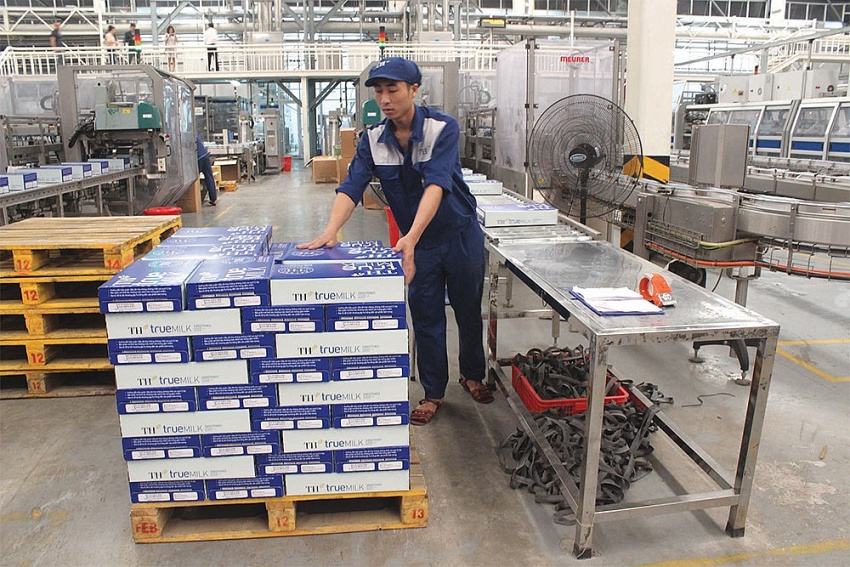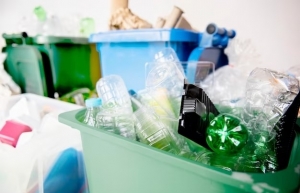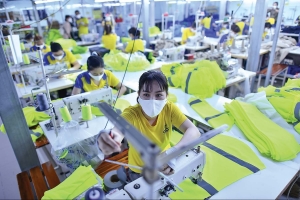Only modern machinery can regenerate life cycle for milk cartons, businesses say
 |
| Only modern machinery can regenerate life cycle for milk cartons, businesses say, photo Thanh Tung |
TH Group and its partners have decided to extend the duration of their milk carton collection, with the aim of fostering positive actions in community-wide packaging collection and recycling, making it a daily habit. This will contribute to the sustainable development of environmental protection solutions, waste reduction, and the promotion of a green lifestyle.
The collection and recycling of product packaging have been regularly and consistently carried out by TH Group, the owner of the TH true MILK brand, for many years, even prior to the official implementation of extended producer responsibility (EPR) regulations.
According to a representative, TH Group has collaborated with Tetra Pak and Lagom to organise campaigns for the collection and recycling of packaging. One notable campaign is the “Collecting cans - spread green living” initiative, which focuses on collecting milk cartons at TH stores. This is also the first circular model of collecting and recycling milk cartons in Vietnam that involves cooperation between the manufacturer, brand, consumers, and collection units. “The crucial challenge for any packaging collection and recycling model lies in the awareness and behaviour of consumers towards waste collection,” said the representative.
In 2022, a two-month pilot campaign attracted the participation of 15,000 customers and collected over 1.1 tonnes of milk cartons. Last year, the programme expanded its scale with a six-month duration at 20 TH true MART stores in Hanoi and Ho Chi Minh City, resulting in a 72 per cent increase in collection compared to the previous year.
“In addition to persistently communicating and updating customers with knowledge and skills on cleaning and collecting cartons, we also implement gift programmes to encourage consumer engagement and participation alongside the manufacturer,” the representative added.
TH Group applies advanced technologies such as removing plastic shrink wrap from bottle caps, reducing the weight of plastic bottles, and reducing the thickness of plastic labels. These initiatives have helped to reduce thousands of tonnes of plastic waste each year.
Many other foreign dairy companies in Vietnam are also making efforts to fulfil their producer responsibilities in accordance with the environment. Do Quoc Thinh, sustainability leader of Elovi Vietnam, a subsidiary of Morinaga Milk Industry from Japan, stated that the company has collaborated with several Japanese companies such as Corelex and BIOPA to collect and recycle packaging waste from production activities into raw materials for the production of other products such as bags and paper rolls.
“Recyclable waste will be handed over to competent units as regulated by Vietnam. Statistics from 2023 showed that the overall recycling rate of solid waste at Elovi reached nearly 67 per cent,” Thinh said.
In 2024, Elovi has set a target to increase the amount of waste milk cartons generated from production and hand them over to Corelex or an equivalent unit to 85 per cent. Additionally, other solid waste generated from production activities will be collected and sorted entirely.
To promote future EPR implementation, the company is committed to controlling the use of plastic packaging from the beginning to reduce plastic waste management issues. They prioritise the use of multi-layer paper packaging instead of plastic packaging and utilise biodegradable plastic caps with a composition of 42 per cent sugarcane residue, which is easily decomposable.
FrieslandCampina, behind brands such as Dutch Lady, Friso, and Yomost, also prioritises sustainable packaging. By 2030, the company aims to collect and recycle all the packaging it uses and produces.
Le Thi Thuy Hao, director of Ha Nam factory and responsible for implementing FrieslandCampina Vietnam’s EPR regulations, stated that the company is currently sorting and recycling all of the internal packaging within the factory. “For external market packaging, we are carrying out recycling to ensure compliance with the EPR regulations and follow the designated timeline,” Hao said. “We are still working with partners for the next phases of the programme. However, like other businesses, we still have some tasks to accomplish with these partners as there are still some uncertainties on the side of the managing unit.”
EPR regulations, which came into effect in January, require manufacturers to take responsibility for recycling products and packaging once discarded by consumers. Alternatively, they can contribute to an environmental protection fund to receive recycling support. Recycling is carried out on a voluntary basis, in which businesses can do it themselves or hire a reputable recycling unit.
Packaging manufacturers are among the first entities to be impacted by these policies, with a mandatory minimum recycling rate ranging from 10-12 per cent. For dairy businesses specifically, collecting and recycling the packaging materials they bring to the market poses a challenge.
Nguyen Van Khien, technical manager of Lagom, a waste collection and recycling company established in 2019, stated that the recycling process for milk cartons requires advanced technology.
“After undergoing multiple stages of strict control, the paper, plastic, aluminium, and other compounds in milk carton packaging are separated to be recycled into different materials. If the polymer film is not properly treated, there is a risk of it becoming fragmented and dispersing into the environment, soil, water, and human bodies, causing unforeseen health risks,” Khiem shared.
According to data from the Ministry of Natural Resources and Environment, there are approximately 15 billion used milk cartons each year, equivalent to 150,000 tonnes of waste, generated into the environment. In Hanoi alone, at least one million milk cartons are discarded, resulting in 10 tonnes of waste. However, the recycling rate for milk cartons is still less than 5 per cent, primarily due to the low value.
Hoang Trung Son, CEO of Dong Tien Paper and Packaging, said, “To meet the recycling requirements, milk cartons need to undergo preliminary processing to avoid contamination with organic waste and excessive moisture. The lack of synchronisation in waste sorting at the source is a significant barrier to implementing EPR.”
 | Plastic recycling efforts kick into gear Manufacturers in Vietnam are utilising a variety of strategies in an effort to establish a new lifecycle for products made from recycled plastic waste. |
 | Green transition creating challenges for garments and textiles SMEs Vietnam has signed 16 free trade agreements (FTAs) with the international community, creating the conditions for firms to expand into new markets and boost profitability, while also posing numerous challenges with their increasingly stringent 'green growth' requirements. |
What the stars mean:
★ Poor ★ ★ Promising ★★★ Good ★★★★ Very good ★★★★★ Exceptional
Related Contents
Latest News
More News
- Rising consumption and travel fuel ‘Tet season’ stocks (February 11, 2026 | 11:43)
- Education as strategic capital: why Dwight School Hanoi represents a long-term investment in Vietnam’s future (February 10, 2026 | 19:00)
- Green logistics–the vital link in the global energy transition (February 09, 2026 | 19:35)
- Wages and Lunar New Year bonuses on the rise (February 09, 2026 | 17:47)
- Temporary relief for food imports as businesses urge overhaul of regulations (February 07, 2026 | 09:00)
- Opella and Long Chau join forces to enhance digestive and bone health (February 06, 2026 | 18:00)
- Vietnam-South Africa strategic partnership boosts business links (February 06, 2026 | 13:28)
- Sun PhuQuoc Airways secures AJW Group support for fleet operations (February 06, 2026 | 13:23)
- Pegasus Tech Ventures steps up Vietnam focus (February 05, 2026 | 17:25)
- The generics industry: unlocking new growth drivers (February 04, 2026 | 17:39)

 Tag:
Tag:




















 Mobile Version
Mobile Version